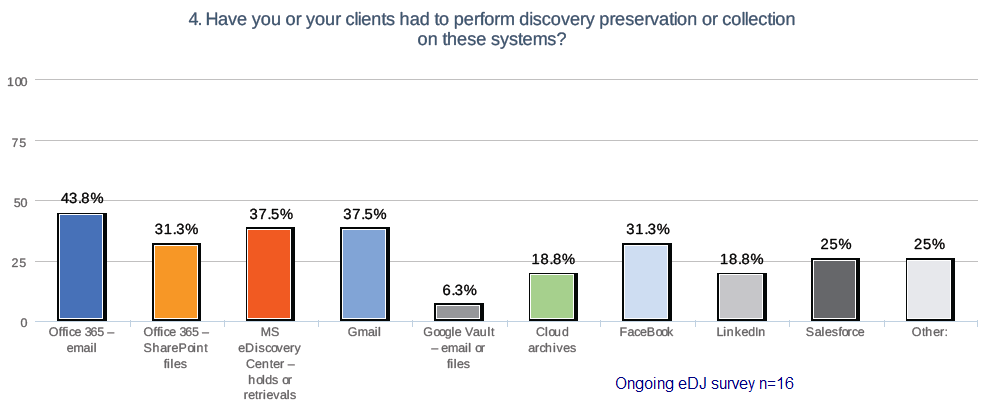Migrated from eDJGroupInc.com. Author: Greg Buckles. Published: 2014-02-16 19:00:00Format, images and links may no longer function correctly.
Before I dive into my thoughts on ‘remote control discovery’ on cloud sources, I want to take a second to say how much we will miss Barry Murphy as he leaves us to run marketing and strategy for X1. Barry and I created the eDiscovery Journal in 2009 to ‘speak truth to the eDiscovery market’. It was his vision to found a new, nimble analyst firm focused solely on the intersection of eDiscovery and Information Governance. He incorporated my ‘Working Analyst’ concept into our aggressive research agenda. He always challenged provider assumptions and insisted on independent research data before forming market perspectives. He was the heart of our analyst practice. It was Barry’s honest assessment of the 2014 market that pushed us to convert from proactive analyst coverage to on-demand research consulting. So we look forward to seeing his impact at X1 as he re-enters the market as a participant and we rebuild our client base and channel partner network.
Preliminary results from my ongoing survey on Cloud Services Adoption have added some interesting context to the LTNY hot topic of Microsoft’s Office 365. As you can see below, 30-40% of consumer respondents (n=16) have already faced discovery of email or files from cloud repositories such as Office 365 or Gmail. What jumped out to me was the 37.5% who have already used the brand new MS eDiscovery Center to place holds or run collections. Early in 2013, eDJ saw the first engagements and inquiries with global corporate clients actively exploring the potential risks and benefits for migrating their key communications and content infrastructure to the cloud. We expected this to slowly ramp up as early adopters testing the waters. We did not expect so many CIO’s to jump straight into the deep end of the pool until the courts, regulatory agencies and other stakeholders gave more concrete guidance and best practices for compliance in the cloud.
 The accelerating migration trend has jumped ahead of many traditional collection technologies and most corporate discovery practices. Search technologies based on direct indexing of static preservation collections are becoming less practical with 50 GB combined mailbox limits in Office 365. Why collect and reprocess every email if you can preserve broadly in place? Before the release of the new 2013 architecture and updated FAST indexes, my validation testing raised serious concerns with the accuracy and functionality of Microsoft’s search. eDiscovery providers shied away from integration strategies that relied on federation of search criteria to enterprise/cloud indexes for fear that their software interface would be blamed for missing key evidence. The second half of 2013 saw a flood of new and established products with search federation integrations with on-premise and cloud Exchange/Sharepoint. Examples include Acaveo, Servient, X1, Exterro, Clearwell, Nuix and many more. Despite promising preliminary test results on the eDiscovery Center’s search, I cannot recommend reliance on any technology or workflow without documented validation testing based on your unique data and usage case requirements.
The accelerating migration trend has jumped ahead of many traditional collection technologies and most corporate discovery practices. Search technologies based on direct indexing of static preservation collections are becoming less practical with 50 GB combined mailbox limits in Office 365. Why collect and reprocess every email if you can preserve broadly in place? Before the release of the new 2013 architecture and updated FAST indexes, my validation testing raised serious concerns with the accuracy and functionality of Microsoft’s search. eDiscovery providers shied away from integration strategies that relied on federation of search criteria to enterprise/cloud indexes for fear that their software interface would be blamed for missing key evidence. The second half of 2013 saw a flood of new and established products with search federation integrations with on-premise and cloud Exchange/Sharepoint. Examples include Acaveo, Servient, X1, Exterro, Clearwell, Nuix and many more. Despite promising preliminary test results on the eDiscovery Center’s search, I cannot recommend reliance on any technology or workflow without documented validation testing based on your unique data and usage case requirements.
My hope is that corporations will bring stakeholders together prior to launching their data and users into the stratosphere. Legal, IT, Compliance, Records and business units need to have their requirements and concerns heard so that executives can make an informed risk/cost decision that maximizes productivity while minimizing risk. Remember that integrations with cloud repositories all involve usage case assumptions and limitations that may impact your discovery capabilities. Get deep with your tech geeks to understand how your potential tech is integrated with the cloud repositories. Or bring in an expert to cut through the confusion and hear about broader strategies used by other companies. Your choice of a specific provider, technology or cloud service makes you responsible for incorporating them into your discovery lifecycle. So do your homework and reap the benefits of this new generation of technologies.
Greg Buckles
Greg Buckles can be reached at Greg@eDJGroupInc for offline comment, questions or consulting. His active research topics include mobile device discovery, the discovery impact of the cloud, Microsoft’s 2013 eDiscovery Center and multi-matter discovery. Recent consulting engagements include managing preservation during enterprise migrations, legacy tape eliminations, retention enablement and many more.
Find Greg at the following upcoming events:
- Feb 20th – CLE Luncheon @ Truluck’s in Houston! Mitigating Risks posed by Social Media users
- Mar 19th – HALSM lunch presentation in Houston – Discovery on Office 365 – The Good, Bad and Unusual
